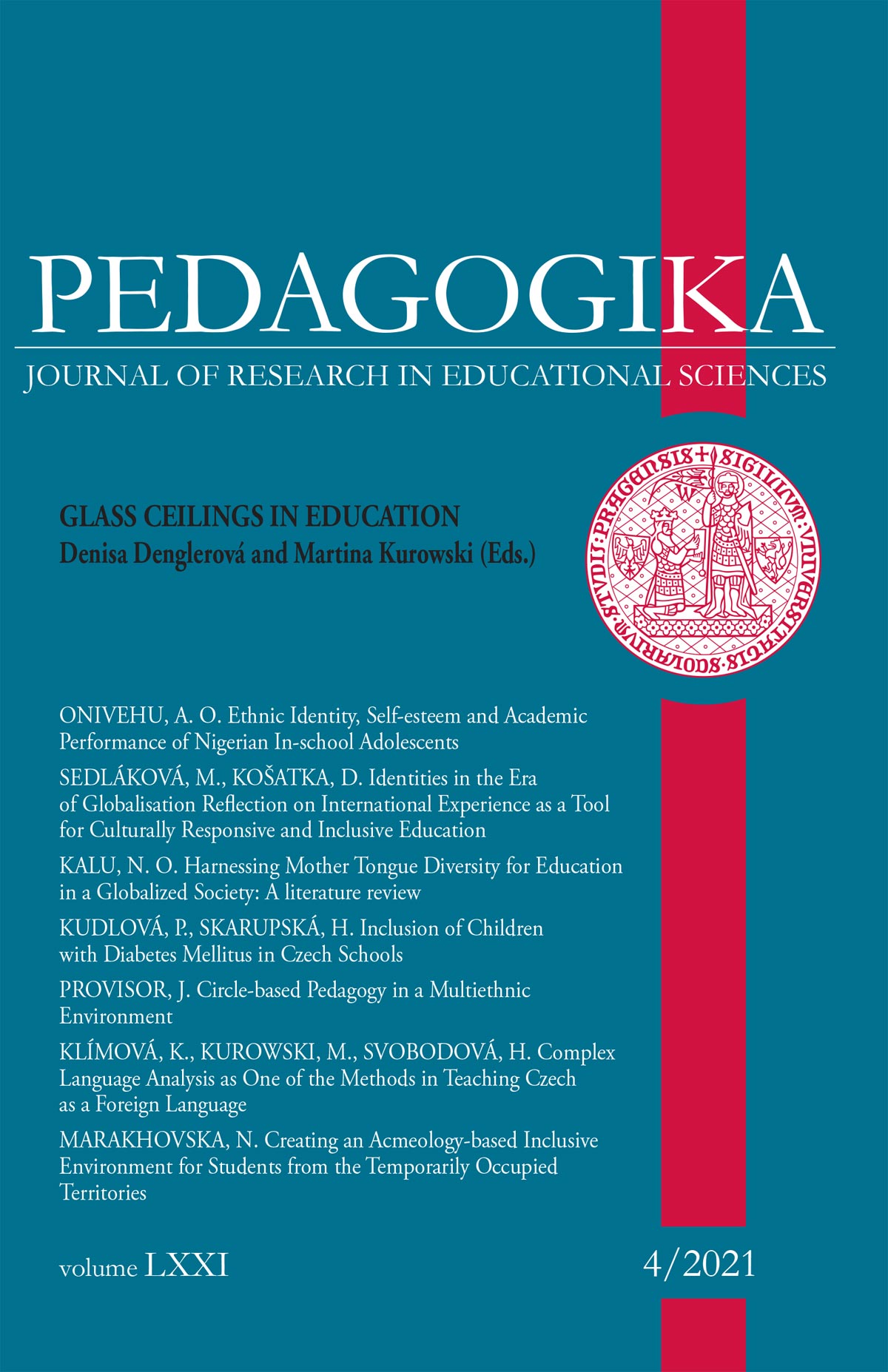Identities in the Era of Globalisation
Reflection on International Experience as a Tool for Culturally Responsive and Inclusive Education
DOI:
https://doi.org/10.14712/23362189.2021.2042Keywords:
identity, culture, internationalisation, language, transformation, responsiveness, reflection, inclusive educationAbstract
Aims: This article analyses the reflections of a range of student teachers on their international experiences for their impact on the students’ personality, comfort, and effectiveness in diverse environments. We will describe the process of identity formation during the time that student teachers are exposed to such environments. We see international experience and raising awareness of diversity as a personal and social developmental part of their professional preparation.This may be seen as contributing to the transformation of the school climate towards inclusive and culturally responsive education.
Methods: The main research question was how the internationalisation of education enhances student teachers’ cultural sensitivity to diversity. The qualitative investigation focuses on aspects of the international experience of student teachers concerning teaching practice. Ten semi-structured interviews with student teachers who have had international experience provided the data.
Findings: Experiencing different socio-cultural environments, we found, impacts on the construction of multiple/hybrid identities and engenders empathy for diversity. The implications for inclusive practice were identified, including reflective teaching strategies, the development of culturally sensitive attitudes, and awareness of others’ perspectives and cultural habits.
Conclusion: A positive benefit for student teachers from grasping and understanding diversity in such an environment is the enhancement of the effectiveness of teaching. The internationalisation of the curriculum expands the student teachers’ responsiveness.
References
Berger, P. L., & Luckmann, T. (1991). Social construction of reality. London: Penguin Books.
Brubaker, R., & Cooper, F. (2000). Beyond "identity". Theory and Society, 29, 1-47.
https://doi.org/10.1023/A:1007068714468
Clarke, A. E. (2005). Situational analysis: Grounded theory after the post-modern turn. Thousand Oaks: SAGE.
https://doi.org/10.4135/9781412985833
Clarke, A. E. (2019). Situational analysis as a critical interactionist method. In M. H. Jacobsen (Ed.), Critical and cultural interactionism. Insights from sociology and criminology (p. 189-210). London: Routledge.
https://doi.org/10.4324/9781315141640-11
Clarke, A. E., Friese, C., & Washburn, R. (Eds.). (2015). Situational analysis in practice. Mapping research with grounded theory. London: Left Coast.
https://doi.org/10.4324/9781315420134
Deardorff, D. K. (2011). Assessing intercultural competence. New Directions for Institutional Research, 149, 65-79.
https://doi.org/10.1002/ir.381
Early, P. C., & Ang, S. (2003). Cultural intelligence: Individual Interactions across cultures. Redwood City: Stanford University Press.
https://doi.org/10.1515/9780804766005
Epstein, C. F. (1992). Tinker-bells and pinups: The construction and reconstruction of gender boundaries at work. In M. Lamont & M. Fournier (Eds.), Cultivating differences: symbolic boundaries and the making of inequality (pp. 232-256). Chicago: University of Chicago Press.
Estelles, M., & Fischman, G. (2020). Who needs global citizenship education? A review of the literature on teacher education. Journal of Teacher Education, 72(2), 223-236.
https://doi.org/10.1177/0022487120920254
Fantini, A. E. (2019). Intercultural communicative competence in educational exchange. A multinational perspective. New York: Routledge.
https://doi.org/10.4324/9781351251747
Gay, G. (2002). Preparing for culturally responsive teaching. Journal of Teacher Education, 53, 106-116.
https://doi.org/10.1177/0022487102053002003
Goffman, E. (2003). Stigma: poznámky k problému zvládání narušené identity [Stigma: notes on the problem of coping with a disturbed identity]. Praha: Sociologické nakladatelství.
Hammer, M. (2012). The intercultural development inventory: A new frontier in the assessment and development of intercultural competence. In M. Vande Berg, R. M. Paige, & K. H. Lou (Eds.), Student learning abroad (p. 115-136). Sterling, VA: Stylus.
Jäggle, M., Krobath, T., Stockinger, H., & Schelander, R. (Eds.). (2013). Kultur der Anerkennung. Würde, Gerechtigkeit, Partizipation für Schulkultur, Schulentwicklung und Religion. Baltmannsweiler: Schneider Hohengehren.
Kalenda, J. (2016). Situational analysis as a framework for interdisciplinary research in the social science. Human Affairs, 26(3), 340-355.
https://doi.org/10.1515/humaff-2016-0029
Kauffmann, N. L., Martin, J. N., & Weaver, H. D. (1992). Students abroad, strangers at home. Education for a global society. Yarmouth: Intercultural Press.Kögler, H., Balon, J., & Hrubec, M. (2006). Kultura, kritika, dialog [Culture, criticism, dialogue]. Praha: Filosofia.
Králíková, A. (2015). Autorské tváře v knižních zrcadlech [Author's faces in book mirrors]. Příbram: Pistorius & Olšanská.
Lamont, M., & Molnár, V. (2002). The study of boundaries in the social sciences. Annual Review of Sociology, 28, 167-195.
https://doi.org/10.1146/annurev.soc.28.110601.141107
Lorenzová, J. (2017). Sociální pedagogika - věda, praxe, profese. K problému utváření oborové a profesní identity sociální pedagogiky. Habilitační práce. Brno: Masarykova univerzita.
Scheuringer, B. (2016). Multiple identities: A theoretical and an empirical approach. European Review, 24(3), 397-404.
https://doi.org/10.1017/S1062798716000120
Shukran, Q. (2014). Sense of place and place identity. European Journal of Social Science Education and Research, 1(1), 306-310.
https://doi.org/10.26417/ejser.v1i1.p306-310
Strauss, A. L., & Corbinová, J. (1999). Základy kvalitativního výzkumu: Postupy a techniky metody zakotvené teorie [Fundamentals of qualitative research: Procedures and techniques of the grounded theory method]. Boskovice: Sdružení podané ruce.
Thomas, D. C., & Inkson, K. (2009). Cultural intelligence: Living and working globally. 2nd ed. San Francisco, CA: Berrett-Koehler.
Valdrová, J. (2006). Gender a společnost [Gender and society]. Ústí nad Labem: Univerzita Jana Evangelisty Purkyně.
Vande Berg, M., Paige, M. R., & Lou, H. K. (2012). Student learning abroad: What our students are learning, what they're not, and what we can do about it. Herndon: Stylus.
Vignoles, V. L. (2017). Identity: personal AND social. In K. Deaux & M. Snyder (Eds.), Oxford handbook of personality and social psychology (p. 289-315). Oxford University Press. Retrieved from: https://www.researchgate.net/publication/316790231_Identity_Personal_AND_Social
https://doi.org/10.1093/oxfordhb/9780190224837.013.12
Vygotskij, L. S. (2004). Psychologie myšlení a řeči [Psychology of thinking and speech]. Praha: Portál.
Wawrosz, P., & Jurásek, M. (2021). Developing intercultural efficiency: The relationship between cultural intelligence and self-efficacy. Social Science, 10(8), 312.



